a guest post by Nicole Rea, MAPH’s 2013 recipient of the Rafael Torch Memorial Fellowship
“What makes you interested in transgender issues?” “So then, are you cis or are you trans?” As a woman perceived to be “cis” doing work that centers on issues faced by the transgender community, these are questions that I’m asked regularly. And, while they annoy me at times (okay, nearly all of the times), I understand their impetus. “Trans issues” are still viewed marginally, if at all, as serious problems in American society. Despite continued barriers to healthcare, housing, and legal resources as well as alarmingly high rates of suicide and drug use, America continues to casually misunderstand the term “transgender” and consequentially dismiss individuals who identify as such. Such dismissal has in turn created a dangerously prejudicial and at times outright violent environment in which trans folk are forced to live. Beyond all of this, I also realized first-hand in a recent medical advocacy training session that transgender persons are often unfortunately pushed to the outskirts of even the LGBTQ purview, as well.
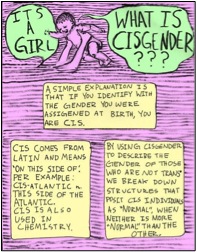
I entered MAPH in September 2012 largely ignorant to these issues. Since that time, I’ve gone through a harrowing (harrowing!) nine month thesis project on the mutually beneficial necessity of trans-feminism, hundreds of hours immersed in reading and research on the issues and prejudices trans-identified individuals still face daily in the United States (as you can see above, the statistics are dismal; if you’re interested in reading more, click here), and now, to finally working as an intern—via the Master of Arts Program in the Humanities’ Rafael Torch Memorial Fellowship—within the Transgender Health Team at Howard Brown Health Center (HBHC) in Chicago’s Uptown. Here at Howard Brown, I work with and report to their amazing Transgender Health Team, helping to create resources and circulate information about trans issues within the HBHC community and beyond.
Since the fellowship enabled us to basically create a position out of thin air, my supervisor Taylor and I originally envisioned it to be a sort of “Cis-to-Trans Liaison,” a go-between for the Transgender Health Team (THT) and the rest of HBHC’s mostly cisgender organization. From the beginning, I felt both nervous and excited to be a part of the team in this capacity; however, as more time has passed and I’ve gotten more deeply involved both within the department and the organization, I’ve also been repeatedly confronted with a surprisingly sinister viewpoint of my own cis privilege, as well as of the problematic nature of “cisgender-ness” in general.
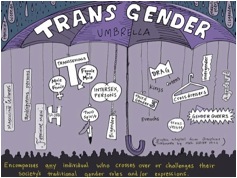
Let me start with an example: Recently, MAPH’s very own Maren Robinson and Sarah Smith graced the Howard Brown offices with their presence for their standard intern check-in. After a quick tour of the HBHC facilities, Taylor and I led them down to a cozy conference room tucked away on the organization’s first floor. We settled in, chatting pleasantly about my time here, the various projects I’
ve worked on, as well as Taylor’s thoughts on me as an employee and mine of her as a supervisor. Taylor had just mentioned to Maren and Sarah how much she would like it if they would direct any trans or gender queer individuals from MAPH in Howard Brown’s direction, when suddenly, in the midst of the conversation, I was struck by a thought.
Almost simultaneous to my realization of it, the thought began to work its way out of my mouth. “You know,” I began, “As much as I love working with the Transgender Health Team—and I do, I really, really love it—it also makes me worry.” All three ladies looked at me expectantly. “You know,” I continued, “Because I think it’s obvious that trans folk are not represented as they should be throughout most departments of most organizations. So while I love being a part of the Trans Health Team, working with great people on great projects, I also worry about inadvertently perpetuating this inequity by being a ‘cis’ person in a previously ‘trans’ safe space. By coming here and doing projects for them as an ally, the last thing I’d want is to accidentally appropriate their department in some way with my presence—silencing actual trans voices with my cis viewpoint in an attempt to help.” All was quiet for a moment before Taylor looked up, met my eye, and said simply, “Yes. I agree with you. I could definitely see that as being a problem.”
The conversation moved on swiftly, while in my mind I was gob-smacked, stuck thinking, “Whoa… What?” Taylor’s answer had completely 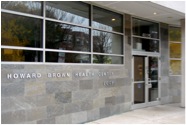 caught me off guard, derailing my own internal rhetoric of “intersectionality!” and “advocacy work!” and “being an ally!,” so completely that despite the fact that I had been genuine in the expression of my epiphany, I was still a little shocked that she would agree with my invasion of this transcentric safe space so readily. And yet, I also realized that she was right. This is just one of so very many moments working here that has truly caused me to check myself before I theoretically wreck myself—moments where my cis privilege becomes almost blindingly impossible to ignore. While, out in the “real world,” just identifying and presenting as a woman—period—is enough to make me feel marginalized, minimized, and unsafe a disturbing amount of the time, here at Howard Brown my dominant class privilege within the Transgender Health Department is nearly embarrassingly obvious—and I believe, for me, that’s a good thing.
caught me off guard, derailing my own internal rhetoric of “intersectionality!” and “advocacy work!” and “being an ally!,” so completely that despite the fact that I had been genuine in the expression of my epiphany, I was still a little shocked that she would agree with my invasion of this transcentric safe space so readily. And yet, I also realized that she was right. This is just one of so very many moments working here that has truly caused me to check myself before I theoretically wreck myself—moments where my cis privilege becomes almost blindingly impossible to ignore. While, out in the “real world,” just identifying and presenting as a woman—period—is enough to make me feel marginalized, minimized, and unsafe a disturbing amount of the time, here at Howard Brown my dominant class privilege within the Transgender Health Department is nearly embarrassingly obvious—and I believe, for me, that’s a good thing.
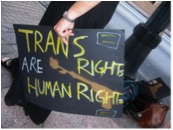 I should say again that I truly love the team I’m working with. Despite my intrinsically heightened awareness of my white, heterosexual, cisgender privilege while working here, I don’t feel like an outsider, or a “them” to their “us.” Every member of the team—all five individuals, and basically everyone I’ve met at Howard Brown since starting here—is funny, fabulous, and brilliant, and the projects I’ve been lucky enough work on have been both challenging and fun.
I should say again that I truly love the team I’m working with. Despite my intrinsically heightened awareness of my white, heterosexual, cisgender privilege while working here, I don’t feel like an outsider, or a “them” to their “us.” Every member of the team—all five individuals, and basically everyone I’ve met at Howard Brown since starting here—is funny, fabulous, and brilliant, and the projects I’ve been lucky enough work on have been both challenging and fun.
Since starting here post-graduation, I’ve created a 20+ page Transgender Health Web Resources section that will soon be added to the Howard Brown website, spanning issues that many trans-identified individuals face daily, including hormone options, surgery information, legal resources, doctor reviews, discrimination aid, youth & family resources, and more. I’ve also created a Trans 101 presentation that I tweak and change daily as my knowledge of transgender issues expands, a new hire transgender competency quiz in the form of an online scavenger hunt, and I’ve now begun to work on an FAQ for their HR department that will address commonly asked questions they’ve run into surrounding transgender issues in the workplace. All of these things are great, and the feedback I’ve gotten from the Transgender Health Team members along the way has been constructive and invaluable. I believe that this work is good, and that it’s important. I believe that I am helping Howard Brown help others, and that this is valuable—even amid my concerns of having become a one cis-woman appropriation army in the process.
I’ve also spent a considerable amount of time thinking about my own gender identity since I first decided on my thesis topic oh-so-many months ago, and this tendency has increased about ten-fold since I began working here. For instance: What does being “cisgender” actually mean? If I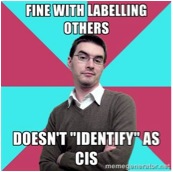 don’t feel like I fit that perfectly into the socially constructed stereotypical label of “womanhood,” and, beyond that, if I view gender overall as being a dangerous social construction that has nothing to do with sex organs and everything to do with a patriarchal system of oppression that I outright refuse to identify with despite my affinity for some good lipstick or a cute dress—then where does that leave me? And when you really stop to think about it, who really does fit perfectly into the gender binary as it’s traditionally understood? Or, as stated in a recent feminist critique of the term “cisgender:” “Who decides whether an individual is sufficiently identified with to be considered ‘cis’? Or sufficiently non-identified with to be ‘trans’? ‘Cis’ and ‘trans’ do not describe discrete social classes from which political analysis can be extrapolated.”
don’t feel like I fit that perfectly into the socially constructed stereotypical label of “womanhood,” and, beyond that, if I view gender overall as being a dangerous social construction that has nothing to do with sex organs and everything to do with a patriarchal system of oppression that I outright refuse to identify with despite my affinity for some good lipstick or a cute dress—then where does that leave me? And when you really stop to think about it, who really does fit perfectly into the gender binary as it’s traditionally understood? Or, as stated in a recent feminist critique of the term “cisgender:” “Who decides whether an individual is sufficiently identified with to be considered ‘cis’? Or sufficiently non-identified with to be ‘trans’? ‘Cis’ and ‘trans’ do not describe discrete social classes from which political analysis can be extrapolated.”
I agree with this, completely. Our society—and, you know, human consciousness as a whole, what with that whole “Other” thing—loves categories. Identities. They make us feel safe, give us spaces where we can “fit in,” characteristics to cling to, and overall make us feel that we belong. None of this is a bad thing—but the divisions that can happen between groups that would otherwise benefit from aligning with one another is. Such an “us and them”—or, worse, “us versus them”—mentality helps no one, and damages many. And yet, despite this fact, nearly all of us still both benefit and are discriminated against daily due to our perceived identities. As much as I would like to do away with the divisional lines of identity that seem to separate me needlessly from my transgender brethren, as long as I am receiving benefits every day of my life for being perceived as “cis,” while others are being hurt, gawked at, ignored, and bullied for being perceived as “trans,” such an absolution from identity-lines is simply not possible. I am cis because I happened to have been born with a vagina, two X chromosomes, and, for the most part, look and act like society thinks that a woman should. And as a person who is privileged as such, it is my responsibility to become an ally to the LGBT community, to persons of color and trans folk and queer folk alike, because somewhere along the line society arbitrarily decided they were not worthy of the same basic rights and dignities that I am, and I disagree with that. Wholeheartedly. (For more examples of cis-privilege, check out this link.)
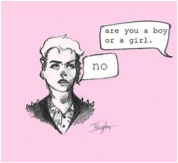 All of this presents me with a problem: How do I successfully advocate for my peers (and boss) in the transgender health department without appropriating their space as my own? As a “trans-to-cis liaison,” how can I try to speak for them or with them without silencing their own unique voices telling of a lived experience that I could never truly inhabit or comprehend? In short: where, exactly, does the line between “ally” and “oppressor” lie? As a cis person who finds the marginalization of trans persons and trans issues incredibly unfortunate at best, and damaging (and dangerous) to society as a whole at worst, how do I proceed in a manner that is constructive to the communities I wish to serve—without invading, appropriating, or changing anyone’s space into something threatening or in-authentic in the process?
All of this presents me with a problem: How do I successfully advocate for my peers (and boss) in the transgender health department without appropriating their space as my own? As a “trans-to-cis liaison,” how can I try to speak for them or with them without silencing their own unique voices telling of a lived experience that I could never truly inhabit or comprehend? In short: where, exactly, does the line between “ally” and “oppressor” lie? As a cis person who finds the marginalization of trans persons and trans issues incredibly unfortunate at best, and damaging (and dangerous) to society as a whole at worst, how do I proceed in a manner that is constructive to the communities I wish to serve—without invading, appropriating, or changing anyone’s space into something threatening or in-authentic in the process?
I’d be lying if I said I had the answer to any of these questions now. But I will say that I’m grateful to have the chance to wrestle with them, as well as to share the little bit of knowledge I have picked up along the way. What I have learned is this: it is precisely because the lines between trans and cis—ally and oppressor—are at times so blurred that it is absurd to believe that any one way of being—trans, cis, gay, straight, religious, atheist, black, white, etc. etc.—is “natural”’ and another “unnatural” or aberrant. Because of my privilege being a cis woman in a trans department in a larger organization filled with people who have no idea whether I’m cis or trans—many of whom, assuming I’m trans because of where I work, noticeably scrutinize me when we meet, analyzing my breasts, my facial features, or checking for my Adam’s apple or a bulge in my pants—I will never again make the mistake of holding the gender performance or expression of trans persons to more intense scrutiny than that of cis persons. Being on the other side of such discrimination, even accidentally, and knowing how it feels has been nothing short of enlightening. Going forward, I will continue to understand and examine my privilege, as well as take cissexism and transphobia very seriously. I will ask what pronouns all persons, regardless of gender identity, prefer, learn people’s names, and treat everyone—full stop—like nothing short of the fellow human being that they are.
Our identities are so complex—so composited and malleable by nature—that there could never be a clear line drawn between oppressor and oppressed. We each take on and inhabit these roles daily, weekly, monthly, etc. Identity politics might be outdated in practice but they live on in the constitution of our internalized selves—as well as how we look at that self in comparison to others. This is the inward battle we each must fight—to know the fact that no one identity is complete or exclusionary. We are each a collection of selves in the midst of the combined experience of human existence. Our success, or our redemption, is bound up part and parcel in the complimentary successes or redemptions of those individuals that surround us—even (or especially) those who are different, those who might scare us, or those that we don’t understand. This is why I’m interested in “transgender issues.” But even more importantly: This is why transgender issues are human issues. This is why transgender issues should concern us all.

“If you have come here to help me, you are wasting our time. But if you have come because your liberation is bound up with mine, then
let us work together.” —Lilla Watson, activist
*but not of the rapey, non-consensual variety
Leave a Reply